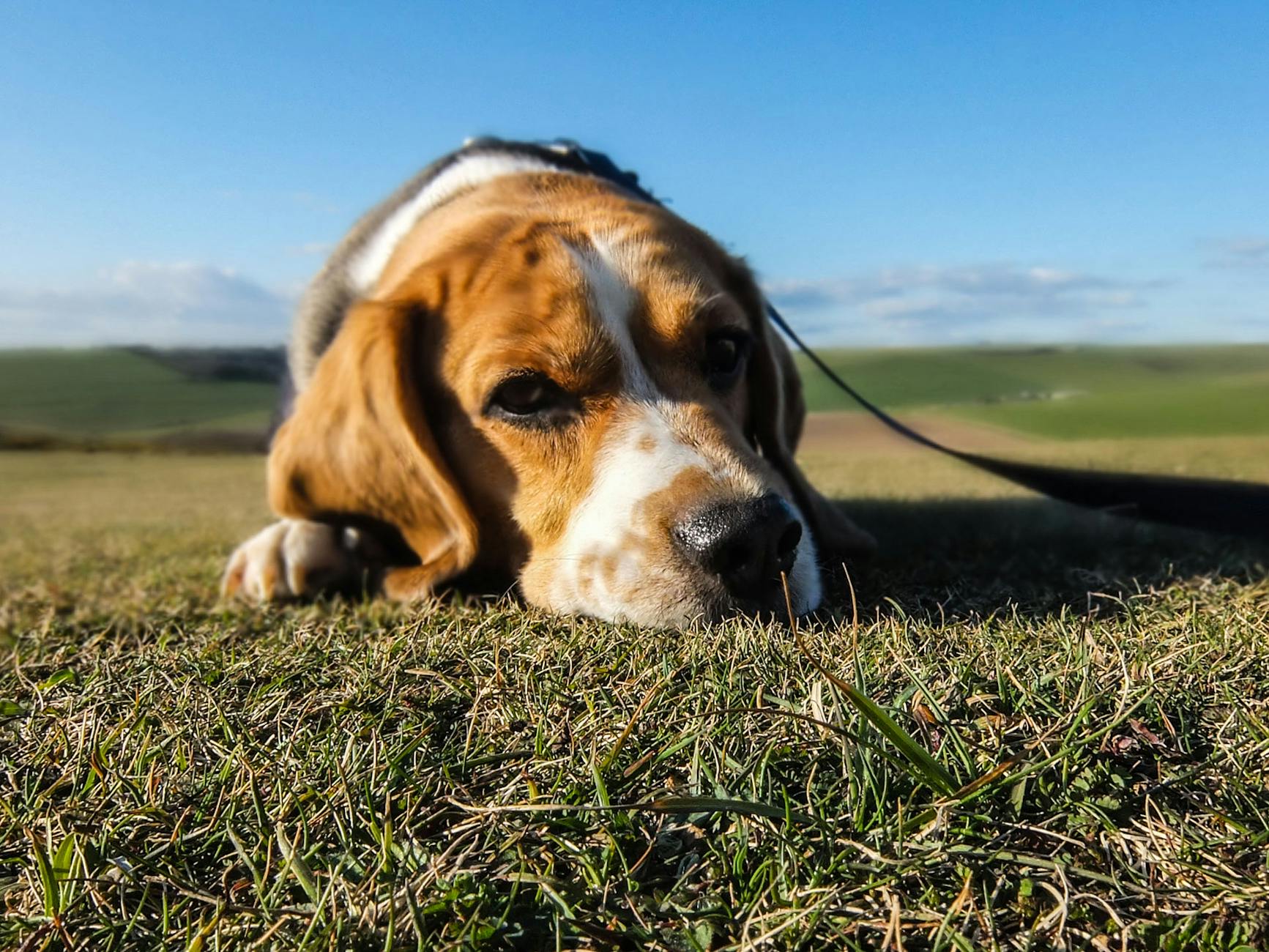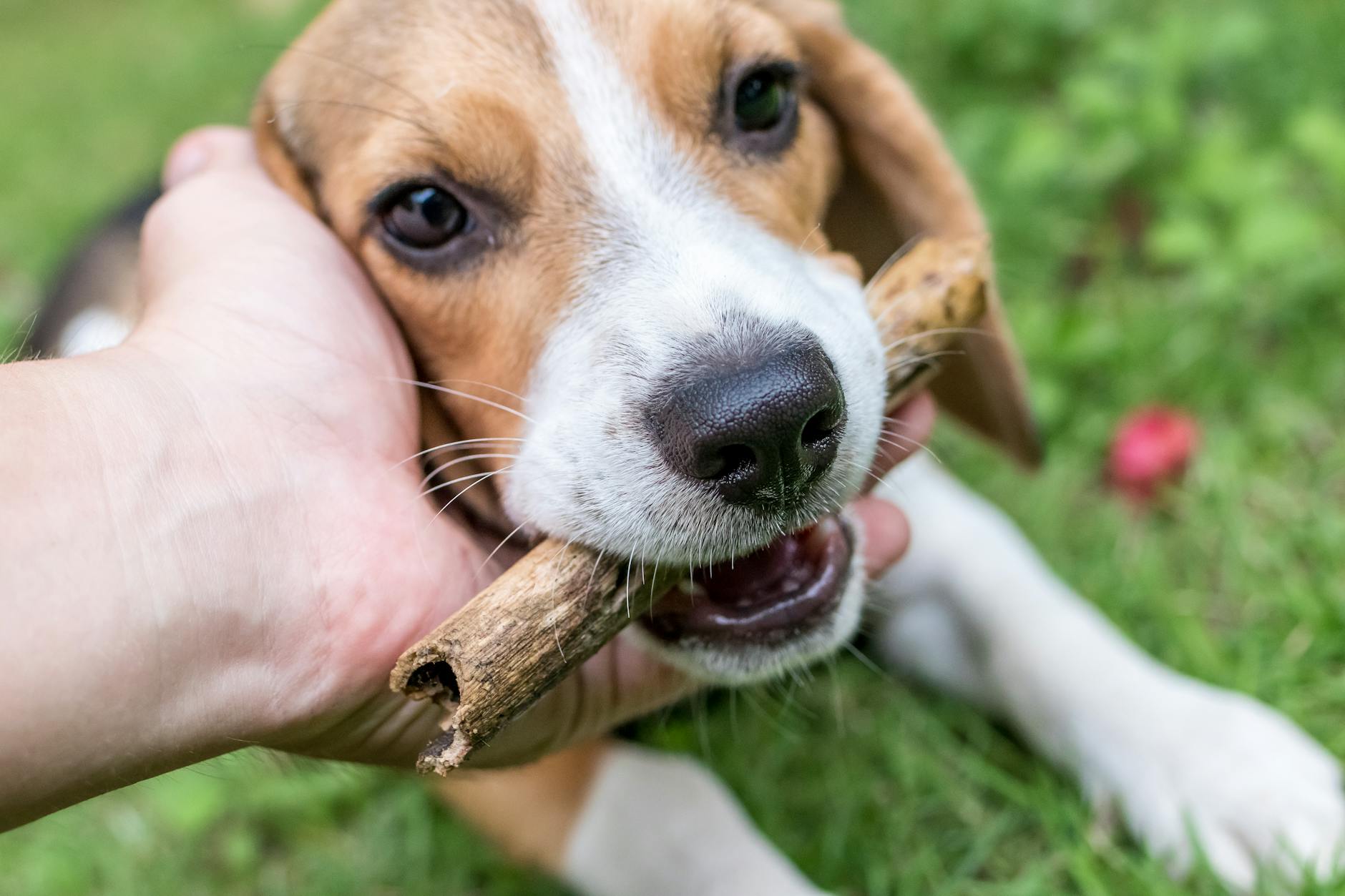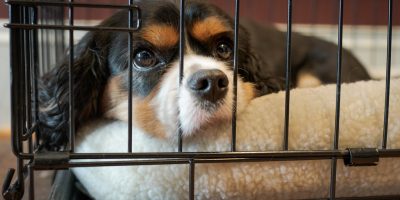
While they might seem small compared to other races, they take a lot of exercises, so it is essential to make sure you have time before you think about having one. It should also be remembered that Beagles appear to bite very hard. Biting, chewing, and nipping are two of Beagle’s most common issues, but don’t worry, they can be fixed. So, how do you keep dogs from chewing on furniture?
Beagles are curious, intelligent, affectionate, and playful. Because of their size and their relationship with children, they are a favorite of families. They love to run around the yard and explore the area. Beagles are an outdoor lover and thrive on sports.
Destructive or aggressive chewing is most frequently found with teething puppies of Beagle, but dogs of any age can show it for several reasons. With this, a Beagle can take anything in its path and essentially rip everything into shreds, even toys that should not be destroyed.
Why are Dogs Chewing Things?
The answer to these questions depends on the dog who chews. The three most common causes for loss of your stuff are puppy teething, boredom, and anxiety about separation.
It’s a natural behavior for dogs who are still young and growing. Puppies like to discover it all, and sometimes do so by sniffing, loving and chewing things.
However, problems can begin when your fur baby makes the difference between your beautiful wooden furniture and your new carpet. It does not help if they’re teething, and all they can do is ease their discomfort. It does not help.
On the other hand, if you have an elderly dog that unexpectedly starts to chew or bark if you are not at home, it is not natural, but rather intense and destructive. Whenever your dog is anxious or bored, he could channel the energy into chewing. It’s why you need to know how to keep dogs from chewing on furniture.
Why Do Puppies Chew Things?
There is no doubt that puppies are adorable little bundles, but you certainly have your hands full when it comes to training. Often problems from constant barking to doing your business in your bed may seem to accompany your lovely pup. Add chewing to the mix and spend all of your free time disciplining a puppy and not going crazy at the same time.
Puppy chewing is often because either their baby teeth erupt or permanent teeth are replaced. The tiny, needle-like teeth break up when your pouch is around three to eight weeks old, and when you’re used to rubbing, they start teething again. Dogs avoid teething when about 4 to 6 months old are aged when they replace all their milk teeth with adult teeth.
Will Aggressive Chewing Fully Stop?
In most instances, this type of activity can be significantly reduced. And it can be resolved entirely in many cases.
The effectiveness of stopping the chewing really depends on how long and what effort an owner takes to stop this action. Improvements can be achieved by combining changes to the house with setup in your Beagle, providing supervision, and a proper reaction to chewing attempts and providing toys that can withstand aggressive chewing and healthy teeth to the extent possible.
How to Keep Dogs From Chewing on Furniture

Your dog will not only ruin your house and land. It can also be risky, as a large number of items pose choking threats, trigger stomach blocks, or split into sharp pieces that can damage the inside of your pup.
That said, you shouldn’t want your dog to stop chewing. Chewing is an integral part of the process of teething. As adults, dogs frequently chew for fun or boredom. Chewing or tearing things up (like paper) can also displace energy or stress.
Being sure that your dog just chews proper items will allow them – and your belongings – to remain healthy. Here are a couple of ways you can keep dogs from chewing on furniture and stop unwanted behavior.
For The Hungry
A hungry dog will have additional incentives to destroy your goods and furniture. He is more likely to eat all he can, or he actually distracts himself from hunger. This is more common in puppies that are not yet adequately adapted to daily diets.
To prevent dogs from chewing, check that they get enough calories for the size, race, and activity level of the dog. Inefficient supply of nutrients in dog food, starvation, a calorie-restricted diet, or dogs can cause chewing for other reasons too.
Puppies that are Teething
The teething process in dogs – a puppy with adult teeth – will last for 6 to 8 months. It begins when puppies are between 4 and 6 months old. That’s not the end, however.
The duration of a puppy’s new teeth can be as long as 18 months. It can be an irritating experience for some dogs, and chewing is a natural way to deal with it.
Good quality and exceptionally long-lasting teething puppy toys can help to handle this. Remember not to discourage chewing in puppies, but to redirect it to eat more suitable stuff such as puppy toys or puppy chews.
Early Separation
Your mother’s daughter is not just his protector and guardian, but also his trainer and example of what to do in the new world. As nature intends, every dog should learn about biting manners from their mothers and their littering partners, brothers, and sisters.
If a puppy is far too early removed from its canine family, it is more likely that scratching, chewing, and sucking would be an issue that will continue for the rest of his life.
Dogs might also chew more due to anxiety about separation after they are left in the house alone. Although it is too late when you already have a separate puppy at home, for future dog owners to adopt a new puppy, this must be kept in mind.
Give more attention to your dog.
A dog’s chewing and chewing behavior are always based on a single individual in the family, even if its reaction is adverse. The best way to prevent dogs from eating is to play games related to their mouth and chewing, and the dog’s chewing toys are available. But during this playtime, do not encourage inappropriate chewing.
Another significant factor is boredom and one of the main reasons dogs are chewing things. Mental stimulation tests indicate that dogs can avoid eating and correct certain unpleasant habits.
If your dog is bored, make sure that he gets enough training to keep away from trouble. Keep your dog up and encourage him with interactive toys or dog games to keep him tired and less likely to kiss or bite.
Mouthing’s Importance
Like human babies, puppies are scratching, crying, chewing, and smelling the world with their mouths. Even as adults, the mouth plays a sensory function far more critical than for humans for dogs. That is how dogs feel their world and understand it.
It takes training to teach dogs how to restrict the use of their mouths to appropriate items, but you have to see the use of mouth as usual and fundamental dog behavior. Enrich the world of your pet with the right stuff that he can put in his mouth. Chewing, biting and mouthing are often linked in puppies.
Observe and offer better choices for chewing.
Try to catch your dog before starting to chew on your furniture, slippers, or something wrong. If you watch regularly, you will know the symptoms of when your dog tries to chew things on and kill them.
Keep chewing products ready and make a fast, calm business as soon as the behavior begins. You do not want to deter your pocket from the normal – encourage it to chew things – just simply redirect your dog and provide better, healthier choices.
How do you keep dogs from chewing on furniture and other things?
Offer them something better!

Chewing Sweets
Yeah, several dogs were tempted by dirty socks and wooden chairs. But the choice between a tasty treat and your furniture is simple. Also, try treatments like dried pig ears, raw beef bones, or bully bones. The flavor and chewiness of these delicacies separate your pooch from the decorations of your shoe set.
Dog Chew Toys
The same applies to toys. On the market, there are several options, from intelligent puzzles and rubber bones to aromatic chewing toys. Choose one that your dog won’t quickly kill and enjoy watching them for hours at last.
Chewing Deterrent
Dog chewing dissuasive often discourages a dog from eating. Use the dissuasive spray to stop your dog chewing on shoes or mobilizers. With no time can they hold everything that you’ve sprayed clear.
There are even different home remedies for preventing your dog from chewing on furniture. In most cases, these DIY remedies are dissuasive sprays made of apple cider vinegar or lemon juice. These natural ingredients won’t hurt your pooch, but keep it away from the furniture you have mixed with.
Encouraging Behaviour
Too much biting is a behavior you don’t want to continue with your Beagle. It’s something you have to stop right away. So, what can you do if you know the possible causes?
If the teeth are sharpening, there are good teething toys that can be conveniently found in pet shops. But it’s only the first step to buy teething toys. You will show your puppy how to use them properly. You need to tell them not to chew on the couch, the table, and the blanket. If your dog is busy chewing and biting other things, teething toys will become useless.
Important Tips to Note

Again, how do you keep dogs from chewing on furniture?
Give your dog suitable chew toys to enjoy. Each dog has a personal preference for what they prefer to chew and play with. Be careful with rough and beef bones, as sure chews can turn them into smaller pieces that can be swallowed.
They can end up in the esophagus or small intestines, so care is needed when such treatments are given to make sure that any small piece is taken away that can be swallowed. Stop chicken bones as they break into small parts that can quickly enter your dog’s gastrointestinal tract. They prefer greenies and dental chewsticks because they promote proper chewing in the fight against dental illness.
Dog toys like balls and kongs may appeal to your dog, just make sure that you pick the correct size for your dog. You should be able to pick it up and take it, but it should be large enough that it can not be swallowed. If you buy a toy check for your dog, make sure that the hole in the toy isn’t so large that it can stick in his lower jaw.
Do not give your dog an old shoe to chew, for example, since he doesn’t know the difference between the old chew shoe and a brand new pair.
1. Adjust the actions of your Beagle.
Don’t try to stop your beagle puppy from chewing thoroughly. Instead, advise them to just eat on essential items. When you see your Beagle chewing on your shoe, find your puppy’s toy and swap your footwear. Once you chew your Beagle happily on your gadget, you can praise them. Your Beagle demonstrates that the new toy is perfect, and your shoe was not ideal.
2. Ensure that you keep your beagle puppy busy.
The best way to stop your beagle chewing is always to make sure you have something to do. Beagle puppies are chewing to be busy. You can change this behavior by walking and playing in your backyard or living room with your Beagle. When you leave your Beagle at any point, make sure they have plenty of toys to keep them going.
3. Train your Beagle with a crate.
When you are away from the house, if your beagle puppy still chews things, you can imagine introducing a crate. If you’re not sure of a cake, you can always put your Beagle in a room – for example, in a laundry room or a living room when you’re out. But remember to leave other toys!
Make a Vet Appointment
Chewing or tearing things can sometimes be the symptom of a more severe issue, such as anxiety about separation. This can occur when dogs are anxious about being left alone without their human beings. If you don’t know how to keep dogs from chewing on furniture, contact your vet.
If you suspect anxiety about separation, you must first arrange an appointment with your veterinary surgeon. They can help you find out if there is anxiety about the separation or another problem.
Separation anxiety treatment may include dietary and exercise changes, training, medications, or therapies. It is not always easy to treat or cure, and progress often takes time. It should, however, help with destructive chewing behavior.
Other medical problems can cause dogs to chew. Pica is simply a disorder in which dogs believe like they need non-food, and pica can also be a sign of specific medical problems.
That’s why talking to your vet is so important. They can diagnose the condition of your dog, prescribe treatment, and even advise on how to correct unwanted behavior.


